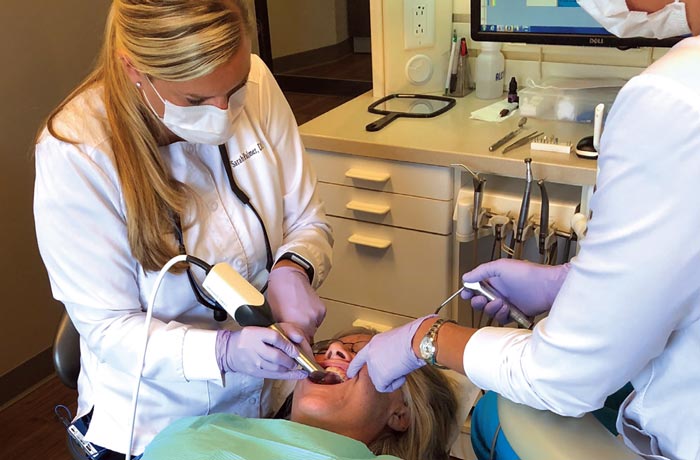Meet Your Pleasant Area Dentist Eugene OR and Their Providers
Meet Your Pleasant Area Dentist Eugene OR and Their Providers
Blog Article
Learn About Regular Dental Issues Your Dental Practitioner Can Fix
Comprehending regular oral issues is vital for keeping ideal oral health and wellness. Issues such as tooth cavities, periodontal illness, tooth sensitivity, halitosis, and dental cavity prevail yet usually ignored until they end up being serious. Dental experts have the experience to identify and treat these conditions, therefore stopping additional issues. Regular dental check outs and personalized treatment strategies can deal with these problems effectively, guaranteeing a healthier and brighter smile. But what details treatments do dentists employ to fight these issues, and how can early intervention make a difference? The responses to these inquiries use important understandings into protecting your dental health.
Cavities
Dental caries, also called cavities, are a widespread dental health issue brought on by the demineralization of tooth enamel because of acid production from bacterial plaque. This procedure starts when bacteria in the mouth metabolize sugars and starches from food, creating acids that deteriorate the enamel. Otherwise addressed without delay, this disintegration can pass through much deeper into the tooth, affecting the dentin and at some point the pulp, potentially resulting in severe pain and infection.
The onset of cavity development often present as white places on the tooth surface, indicating preliminary demineralization. As the process advances, these areas can become brownish or black lesions, symbolizing more extensive decay. Regular dental exams are crucial for early discovery, as dental caries in their incipient stages can be treated with remineralization methods, such as fluoride treatments.
As soon as a tooth cavity has actually developed, restorative treatment is required. Dental practitioners generally remove the corroded section of the tooth and load the tooth cavity with materials such as composite material, amalgam, or ceramic. In extra extreme situations, a crown or origin canal therapy may be needed. Preventive measures, consisting of good oral hygiene practices and nutritional adjustments, play a crucial role in alleviating the risk of dental caries.
Gum Tissue Illness
While cavities represent a considerable problem for dental health and wellness, one more important issue that demands attention is periodontal disease. Understood as gum illness, gum illness is an inflammatory condition impacting the cells surrounding and supporting the teeth. It is mainly triggered by the buildup of plaque-- a sticky film of microorganisms that creates on teeth.
Gum tissue illness progresses through stages, starting with gingivitis, defined by redness, swelling, and bleeding gums (dentist in eugene oregon). If left untreated, gingivitis can intensify to periodontitis, where the internal layer of the periodontal and bone retreat from the teeth, forming pockets that come to be contaminated. In time, the toxins produced by the microorganisms break down the bone and connective cells that hold teeth in position, potentially causing missing teeth
Early discovery and therapy are critical. Professional dental cleanings and improved oral health practices, such as brushing twice daily and flossing, can take care of gingivitis. For more advanced phases, therapies might consist of scaling and root planing, anti-biotics, and even medical interventions.
Routine oral examinations play an essential role in taking care of and stopping periodontal condition. Dentists can determine very early indicators and advise proper treatments, guaranteeing the upkeep of healthy and balanced periodontals and total dental health and wellness.
Tooth Level Of Sensitivity
Tooth level of sensitivity impacts countless individuals worldwide, providing a common yet often distressing oral issue. This problem develops when the enamel, the outer protective layer of the teeth, is compromised, disclosing the underlying dentin. The dentin has tiny tubules that lead straight to the dental pulp, where nerves reside. When revealed to stimuli such as hot, cool, pleasant, or acidic substances, these nerves are activated, creating sharp discomfort or pain.
Several elements add to enamel disintegration and subsequent tooth sensitivity, consisting of hostile cleaning, acidic foods and drinks, gum economic crisis, and bruxism (teeth grinding) In addition, dental procedures such as teeth lightening can additional reading temporarily heighten sensitivity.
Foul Breath
One more widespread dental concern that influences individuals' daily lives is poor breath, clinically termed bad breath. Halitosis often originates from inadequate dental hygiene, which permits food bits to stay in the mouth, promoting bacterial development.

Dentists play a critical function in identifying and dealing with bad breath. They can determine the source through an extensive examination and give customized recommendations and treatment plans. Referrals might include improving oral health techniques, such as routine brushing and flossing, utilizing anti-bacterial mouthwashes, remaining hydrated, and dealing with any type of dental problems. In some instances, a reference to a professional might be needed to take on underlying wellness issues adding to halitosis. Effective management of halitosis not just boosts dental health yet additionally significantly enhances lifestyle.
Dental Cavity

Preventing tooth degeneration includes a combination of great oral health techniques and routine dental examinations. Cleaning teeth a minimum of two times daily with fluoride tooth paste, flossing to remove plaque between teeth, and limiting the intake of sugary foods and drinks are crucial safety nets. Fluoride therapies, oral sealers, and specialist cleansings given by a dental expert can additionally play a substantial duty in strengthening enamel and preventing degeneration.
Dentists can get rid of decayed tissue and bring back the tooth with fillings made from materials such as composite material, amalgam, or porcelain. By attending to tooth decay without delay, dental practitioners assist protect oral framework and feature, making sure lasting dental health.
Verdict
Dealing with common oral worries such as tooth cavities, gum tissue illness, tooth sensitivity, foul-smelling breath, and dental caries is important for maintaining ideal dental health and total well-being. Dental professionals have the know-how to detect and deal with these problems effectively, making certain tailored take care of each patient. Routine oral check-ups and safety nets are necessary in determining and taking care of these concerns early, promoting a much healthier and more confident smile over a life time.

Tooth degeneration, also recognized as oral caries, happens when the enamel, the outer layer of the tooth, is eroded by acids created by germs in the mouth. Brushing teeth at least two times daily with fluoride toothpaste, flossing to eliminate plaque between teeth, and restricting the intake of sweet foods and drinks are crucial preventative procedures.Dealing with usual dental issues such as dental caries, gum tissue condition, tooth sensitivity, negative breath, and tooth degeneration is vital for maintaining optimum oral wellness and general health.
Report this page